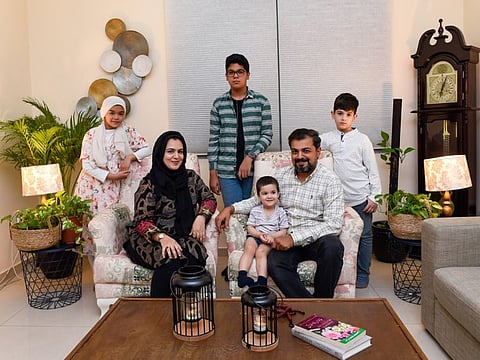Video: Ramadan 2022 - The right ingredients for iftar at a Pakistani family’s home in Dubai
Prayer, treats and family time add flavour to the sunset meal to end the day’s fast

Dubai: Rubab Zahra, a Pakistani expat in Dubai, is especially happy to host guests these days, during Ramadan.
“Ramadan is a month of sharing and caring, so you are most welcome to our house,” said the 31-year-old as she welcomed us in.
“Through the year we unintentionally commit some mistakes. Ramadan is a time for us to cleanse ourselves of those mistakes,” added her husband Aqeel Mumtaz, 37.
Her children – Zain Aqeel, 12; Raya Fatima, 10; Aqib Aqeel, 8; and Adn Fatima, 2; are equally excited to be hosts for iftar.
What is iftar?
“Iftar is the meal to end the fast at sunset. Typically, people will enjoy dates, dried apricots and Ramadan juices, before heading to evening prayer. After that, large meals are the norm, usually with family and friends. Suhoor [on the other hand] is a meal taken before sunrise, before the day of fasting starts,” explained Rubab.
On the menu
For iftar, she has prepared an interesting spread – a mix of carb-based food, fruits and a refreshing welcome drink of Rooh Afza [a brand of rose syrup]. The customary dates are on the table, of course. The couple and their oldest son Zain say ‘Bismillah’ (in the name of Allah) before ending their fast. They have Rooh Afza first and partake of some dates.
On the table are two large plates of pakoda (fritters) laid out. “I prepared onion pakoda and also fritters with potato filling. This is an essential dish on the iftar table of a Pakistani household.”
Aqeel, who was born and brought up in Dubai, said he always like to see a mix of cuisine on the iftar table. “When it comes to food, our family has always been open to trying new cuisines – especially Middle Eastern. So while we enjoy traditional Pakistani mains, we also try a hand at Lebanese, Syrian or Egyptian dishes on some days,” he added.
Rubab has also made a yoghurt-based dish (raita) from whole chickpeas and fried chickpea flour (boondi). It is soothing as the spice is mild and the yoghurt adds a very cooling effect. She has also made a chicken wrap.
Ramadan plans
“It’s a tradition in our family back in Pakistan to donate money for charity. In Islam… we have to share money, especially among those who are in need of financial assistance. So as a family, we will make our contribution for charity this year also,” said Aqeel.
Teaching children
Rubab said she and her husband Aqeel teach their children to love, care and share. “Young minds can make a big difference for tomorrow. As parents, we teach our children to share and care.”
As for preparing young minds for fasting, Rubab said children gradually train their minds so they are ready for fasting. “So far, my fasting has been going well. At school as well I am not tempted to drink water or eat even though other students are doing the same,” Zain said.
“Ramadan is a month of bonding with family and friends more than any other time. I always say this, together we are stronger."
Iftar Recipe : Pakoda
Pakoda, also known as pakora, is a deep friend snack popular in Pakistan and India. The dish is made with besan (gram flour), salt, spice and a main ingredient onion or a vegetable. For example, in onion pakoda, the main ingredient is onion. It is usually served with yoghurt-mint chutney or ketchup.
How to make Onion Pakora
Preparation
1. In a mixing bowl, add:
2. Mix all of them well and squeeze the onions a couple of times so they begin to release moisture. Set this mixture aside for 5-10 minutes.
3. Sprinkle the mixture with the below
4. Mix everything well.
5. Sprinkle two tablespoons of water to make the moisture moist. Do not pour water. Only sprinkle water. The mixture should be tight not soggy.
6. Next heat oil in a pan and drop balls of this mixture inside.
7. Stir the dough occasionally until it turn golden brown
8. Serve in a plate with chutney or ketchup on the side.
Sign up for the Daily Briefing
Get the latest news and updates straight to your inbox



